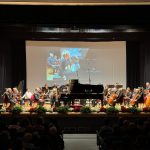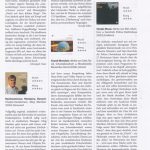INTERNATIONAL PIANO
March/April 2004
Shostakovich
Piano Concerto no.1 in C minor, Op.35.
Piano Concerto no. 2 in F, Op.102. 24 Preludes, Op. 34
Oleg Marshev (piano)
Helsingborg SO/ Hannu Lintu
Danacord DACOCD 601
Who would have thought it? I have heard quite a few of Oleg Marshev’s Danacord recordings, and liked many of them a good deal; but I was fairly disappointed with his recent Rachmaninoff concertos cycle. Now, out of the blue, he comes up with a Shostakovich disc as impressive as any I have encountered. In the concertos I fancy he has at last displaced my long-standing loyalty to Alexeev and the composer himself, and I certainly haven’t come across an account of the Preludes that approaches his for idiomatic insight.
It takes a very special artist to get everything out the two concertos, so varied and mercurial are their moods. The soloist has to switch from melancholy to mania in an instant, to hide deep feelings behind a poker-faced facade and to play the fool while aching inside. All this Marshev does, or suggests, with extraordinary aplomb. His fast movements are racey and cartoonish, as they should be, without ever sacrificing musical poise, and his slow movements are given the depth and melancholy I have always craved but hardly ever (maybe I mean never) heard.
Credit for these outstanding performances has to be equally shared with the members of Helsingborg Symphony Orchestra and their 35-year-old Chief Conductor. I simply can’t remember another recording of these works where so much pertinent detail and characterisation is revealed, and trumpeter Jan Karlsson manages the low-lying solos (Gershwin-inspired?) in the slow movement of the First Concerto superbly. None of the detail obtrudes on the bigger picture; on the contrary it brings it up sparkling as never before.
As for the Preludes, pick almost any one of the 24 and you will find Marshev doing something beyond the obvious. Not that he caricatures them, in the manner of Olli Mustonen. Rather, he plays them from the perspective of one who knows Shostakovich’s background as a composer for stage and screen and who can therefore hear this music as a series of distilled studies in specific imagery, mood or character.
I would have liked a slightly longer pause between the second and third movements of the First Concerto, and the piano perhaps does not need to be quite so closely balanced. But let me repeat: this is an outstanding disc – one of the finest, if not the finest ever, of all three works, and by a huge distance the best concerto issue to have come my way over the past 12 months. Each time I hear it I find it more thrilling.


